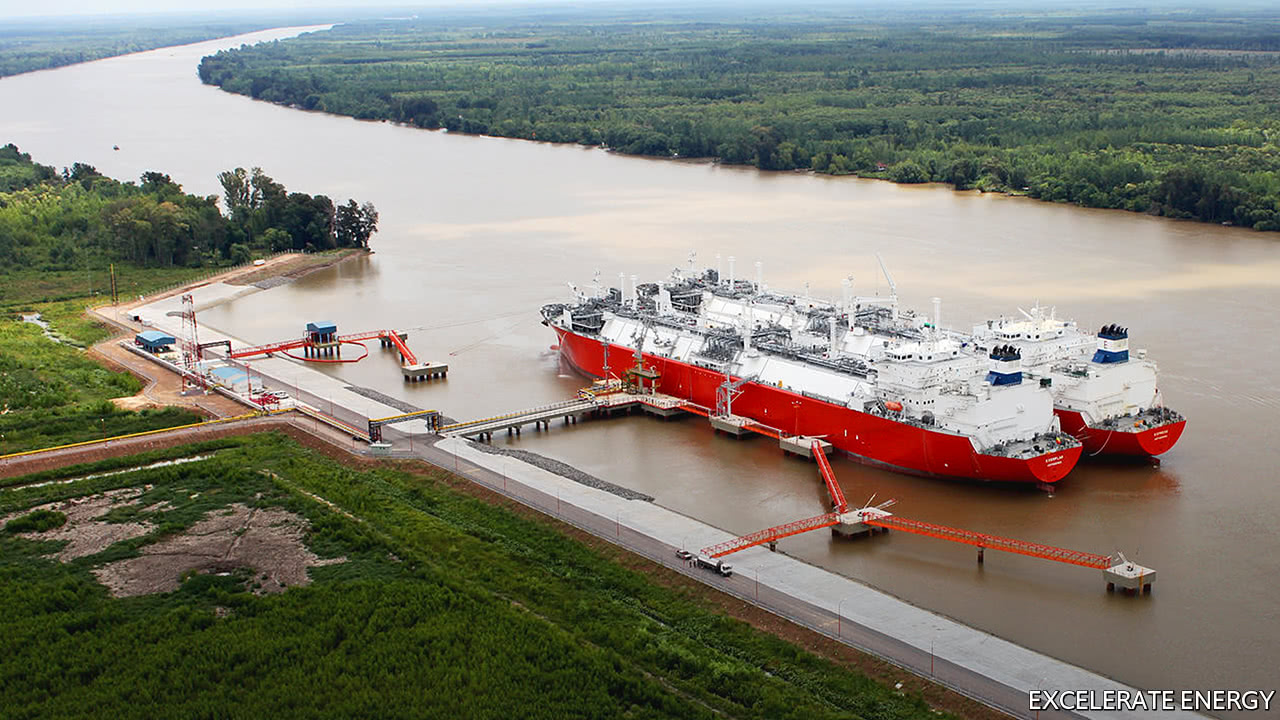
WHEN it comes to liquefied natural gas (LNG), the supermajors have supersized appetites. The likes of Royal Dutch Shell, ExxonMobil and BP make discoveries described as “elephants”; their cost overruns alone can run into the tens of billions of dollars; and projects take the best part of a decade to complete. For years, the industry has demanded fixed, long-term contracts from their customers to justify the size of these megaprojects.
The producers also have pretty big problems. They are in the midst of a vast expansion in Australia and elsewhere just as the shale revolution and the start of American LNG exports has brought an unexpected burst of gas onto markets, clobbering prices for the foreseeable future and forcing producers into concessions. Demand in rich countries such as Japan and much of western Europe appears to be in long-term decline.
-
The Gates Foundation is worried about the world’s health
-
Retail sales, producer prices, wages and exchange rates
-
Foreign reserves
-
Why Italy’s troubled economy is returning to form
-
Sorry, Roger: Rafael Nadal is not just the king of clay
-
Sam Brownback, governor of Kansas, heads for the exit
At least one big customer, China, is making life easier. Thanks to low prices and government policies favouring gas over coal, its consumption of LNG has shot up by 50% in the past year. But domestic gas production is growing, and within two years it expects to pipe in huge volumes of Russian gas, so it can play suppliers off against each other. India is a more immediate problem. On September 11th its main importer, Petronet LNG, said it had provisionally renegotiated a 20-year supply contract with ExxonMobil that is expected to bring in gas from Australia at lower cost, albeit in larger volumes. It is the second time in two years that India has arm-twisted a producer into offering better terms.
The result is that huge LNG producers are increasingly reliant on small developing countries. The International Energy Agency, a body that represents energy consumers, says the number of LNG-importing countries has risen from 15 in 2005 to 39. Imports are rising at their fastest rate since 2011, in part because of demand from these places. Like India, low prices also embolden them to demand concessions. “We have a situation that is wonderful for emerging markets. It’s a buyers’ market,” says Lance Crist of the International Finance Corporation (IFC), the private-sector arm of the World Bank.
The trouble is, many energy-hungry countries lack the pipeline networks to distribute gas. Nor do they possess the creditworthiness to sign long-term contracts. To tap new markets, the gas giants need to think small, not big. They must recognise that flexibility is vital, analysts say.
One way of doing this is to support the development of floating terminals, rather than fixed infrastructure, to bring gas to coastal cities. One model is Excelerate Energy, a Texas-based firm that provides floating storage and regasification units (FSRUs), which turn the liquefied hydrocarbons into gas, and pipe it ashore to power plants and local grids. One of its projects (pictured), backed by the IFC, is to supply gas to a coastal town in southeastern Bangladesh, starting next year. Nick Bedford, the firm’s chief financial officer, says the cost to Petrobangla, the state oil company, will be $85m a year, excluding the gas.
In contrast, building an onshore regasification plant instead could cost a hefty $1bn, and would commit the country to natural gas for decades, even as the promise of renewable energy becomes more attractive. FSRUs are stimulating smallish pockets of demand around the world. Last year Total, the French supermajor, took a leaf out of Excelerate’s book by agreeing to spearhead an FSRU project in Côte d’Ivoire.
Another option is for big oil companies to give financial support for the construction of gas infrastructure in poor countries as a way to foster demand. This week Shell took a step in that direction by announcing that it is exploring a joint project with a Nigerian firm, Shoreline Energy, to bring domestic gas to an area near Lagos. Kola Karim, Shoreline’s boss, said the proposed $300m project would enable Shell to pipe gas into places where the infrastructure is “shot to bits”. But it is a departure from Shell’s core job of producing gas globally.
Such ventures may become more widespread if big LNG export projects extend to places like Mozambique and Tanzania, which are starved of fuel domestically. Tisha Schuller of Adamantine Energy, a consultancy, says LNG producers have a delicate balancing act. On the one hand, they want to avoid accusations of fostering an “addiction” to fossil fuels in poor countries with strong renewable-energy potential. On the other hand, reducing energy poverty by supplying gas, which is cleaner than coal and oil, could enhance their reputations. As Western consumers and financiers increasingly turn against fossil fuels, getting that balance right in the developing world will be vital.
Source: economist
Global LNG giants turn to poor countries for new markets